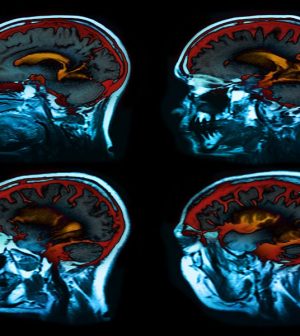- Could Your Grocery Store Meat Be Causing Recurring UTIs?
- Are You Making This Expensive Thermostat Error This Winter?
- Recognizing the Signs of Hypothyroidism
- 10 Strategies to Overcome Insomnia
- Could Artificial Sweeteners Be Aging the Brain Faster?
- Techniques for Soothing Your Nervous System
- Does the Water in Your House Smell Funny? Here’s Why
- Can a Daily Dose of Apple Cider Vinegar Actually Aid Weight Loss?
- 6 Health Beverages That Can Actually Spike Your Blood Sugar
- Treatment Options for Social Anxiety Disorder
Brain Disconnects Spotted in Parkinson’s Patients With Visual Hallucinations

Researchers say they’ve discovered a possible explanation for visual hallucinations in people with Parkinson’s disease.
The researchers conducted brain scans on 15 patients with visual hallucinations, 40 patients without visual hallucinations, and a control group of 15 people without Parkinson’s disease.
In all of the Parkinson’s disease patients, numerous areas of the brain communicated less with the rest of the brain, compared to the control group, the Netherlands researchers noted.
But patients with visual hallucinations had several additional brain areas with decreased connectivity with the rest of the brain, especially areas that are important in maintaining attention and processing of visual information.
However, the study did not prove that this caused the hallucinations.
The study was published online Sept. 27 in the journal Radiology.
“Visual hallucinations in Parkinson’s disease are frequent and debilitating,” study author Dr. Dagmar Hepp, from VU University Medical Center in Amsterdam, said in a journal news release.
“Our aim was to study the mechanism underlying visual hallucinations in Parkinson’s disease, as these symptoms are currently poorly understood,” Hepp added.
Future research could explore whether stimulating the brain areas with decreased connectivity could help treat visual hallucinations in people with Parkinson’s disease, the study authors suggested.
More information
The Parkinson’s Disease Foundation has more on Parkinson’s disease.
Source: HealthDay
Copyright © 2026 HealthDay. All rights reserved.










